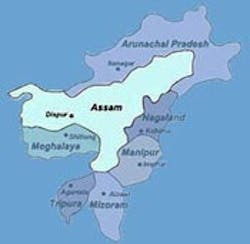Safe Drinking Water a Rarity in Assam
Providing safe drinking water to the public has been a priority in Assam. The state is flooded every year by the monsoons, and safe drinking water becomes a rarity leading to various water borne diseases.
According to a Assam Human Development report, just 45.86 percent of the population in Assam has access to safe drinking water and only 43.28 percent of households in Assam have access to safe drinking water in comparison to 55.54 percent of rural households at the all India level.
"The major problem of the people in this region, particularly in the villages, is that they suffer a lot from diarrhea, dysentery and other gastro-intestinal disorders. The major reason is because the water is contaminated with bacteria and other amoebic dysentery, protozoa etc. The government is trying to give pure, treated water to the people, which is a very huge task and may take many years to reach all villages," said Abhid Gupta, Principal Investigator.
To tackle this precarious situation, the Department of Ecology and Environmental Science has implemented the Solar Water Disinfection (SODIS) project in the Cachar district of Assam. SODIS is based on an old, but rarely used method of water purification.
The treatment consists of exposing transparent water containers to sunlight for about five hours at a stretch. The high temperature eliminates the pathogens, thus leaving the water free of impurities.
About 24,000 households in 20 villages of the district are using this SODIS water regularly, which benefits 124,000 people directly. In fact the project is the first of its kind in the North East and has received a tremendous response from villagers, who not only find it cheap but highly effective.
"We can encourage some young people to start to prepare this water on a commercial scale. It could be a decentralized kind of self-help group scheme. In the laboratory we will conduct tests whether it is viable. I do not see any problem," said Gupta.
Source: WebIndia123.com
